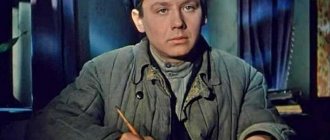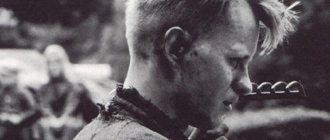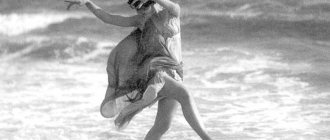“Life seems, now that we have managed to somehow remember it, as a chain of gross and tedious mistakes. I alone am to blame for them. I didn’t know how to live, love, or even work. I wasted my talent on fruitless inventions, tried to squeeze them into life, but nothing came of it except torment and deception. By doing this, I pushed away wonderful people who could have given me a lot of happiness.
The consciousness of guilt before others fell on me with all its terrible weight. Using the example of my life, one can verify the simple law that going beyond the boundaries of the real is dangerous and absurd,” wrote Konstantin Paustovsky in his “Last Chapter.”
Hatice
When the First World War began, Konstantin Paustovsky, as the youngest son in the family, was exempt from conscription. But sitting at university lectures was unbearable for him, and only in Moscow they began to form rear ambulance trains, Paustovsky entered one of them as an orderly. This is how he met his first wife, sister of mercy Ekaterina Zagorskaya, Hatice. The name Khatice was given to her by the Crimean Tatars when she lived one summer in a Tatar village on the seashore. This is how the Russian name Ekaterina is translated into Tatar.
“...I love her more than my mother, more than myself... Hatice is an impulse, an edge of the divine, joy, melancholy, illness, unprecedented achievements and torment,” wrote Paustovsky.
Konstantin Paustovsky in his youth
In 1916, they got married in the Ryazan church, where the bride’s father had once been a priest. Paustovsky already understood that he was a writer. In his youth, fate shook him considerably: after the war, he was engaged in reporting work in Moscow, and heard Lenin speak several times. He left for Kiev, was successively mobilized into the Petliurite and then the Red Army, ended up in Odessa, where Ilf, Kataev, Babel, Bagritsky and other wonderful young writers lived and worked in those years, and returned to Moscow. All this time, the life of Paustovsky and his Hatice was subordinated to one goal - everyone should know how talented he is, his books should be published... Catherine was the writer’s muse, his comrade, the mother of his son Vadim.
“Father was always rather inclined to reflection, to a contemplative perception of life. Mom, on the contrary, was a person of great energy and perseverance<...>.
The marriage was strong as long as everything was subordinated to the main goal - the father's literary work. When this finally became a reality, the stress of the difficult years took its toll, both were tired, especially since my mother was also a person with her own creative plans and aspirations.
Besides, frankly speaking, my father was not such a good family man, despite his outward complaisance. A lot had accumulated, and both had to suppress a lot. In a word, if spouses who value each other still break up, there are always good reasons for this,” Vadim wrote many years later.
Konstantin Paustovsky - short biography and books
Konstantin Georgievich Paustovsky was born in Moscow, in the family of a railway statistician, on May 19 (31), 1892. As Paustovsky recalled, his father was a Protestant and an incorrigible dreamer, for which reason he often changed jobs. After a series of moves, the Paustovsky family settled in Kyiv. Konstantin Paustovsky studied at the First Kyiv Classical Gymnasium in Kyiv. When he was in the 6th grade, his father left the family, and young Kostya had to earn a living and study on his own by tutoring. Alexander Green had a very strong influence on Paustovsky in his youth. The first story Paustovsky wrote, “On the Water” (1912), which he wrote while studying at the gymnasium for the last year, was published in the Kiev almanac “Lights”. After graduating from high school, Konstantin Paustovsky continued his studies - first at Kiev University, and after some time he transferred to Moscow University. The First World War broke out and my studies had to be interrupted. Konstantin Georgievich becomes a counselor in the Moscow tram depot, and later works on an ambulance train. In 1915, together with a field medical detachment of the Russian Army, he retreated through the territory of Poland and Belarus. When two older brothers died at the front, Konstantin Paustovsky returns to Moscow to his mother, but after some time he begins a wandering life again. He worked for about a year at a metallurgical plant, first in Yekaterinoslav, then in Yuzovka, and later at a boiler plant in Taganrog. In 1916 he became a fisherman in a fishing cooperative on the Sea of Azov. While living in Taganrog, Konstantin Georgievich began writing his first novel, “Romantics,” the content and mood of which fully corresponded to the title. Paustovsky created a fascinating narrative about the years of his youth. During the February and October revolutions of 1917, Konstantin Paustovsky was in Moscow. After the establishment of Soviet power, he began working as a journalist. But soon he was again captured by the desire to travel: first he left for Kiev, where his mother later moved, and then Konstantin Georgievich ended up in Odessa, where he fell into the circle of young talented writers - I. Babel, G. Shengeli, I. Ilf, E. Bagritsky and other authors. After two years in Odessa, he leaves for Sukhum, after which he moves to Batum, and finally to Tiflis. Travels around the Caucasus lead Konstantin Paustovsky to Armenia and later to northern Persia. Only in 1923 did Konstantin Paustovsky return to Moscow and become editor of ROSTA. At this time, many of his essays and stories were published. In 1928, the first collection of stories by Konstantin Paustovsky, “Oncoming Ships,” was published.In the same year, a new novel, “Shining Clouds,” was written. While writing this novel, Paustovsky worked for the newspaper “On Watch,” with which A. Novikov-Priboy V. Kataev and M. Bulgakov collaborated, who, by the way, was Konstantin Paustovsky’s classmate at the First Kyiv Gymnasium. In the 30s, Konstantin Georgievich worked as a journalist in the newspaper Pravda and in the magazines 30 Days, Our Achievements and others. During these years, he made trips to Kalmykia, Solikamsk, Astrakhan and many other regions of the country, visiting a significant part of it. The impressions from the trips were embodied in many of the writer’s works of art. In the story “Kara-Bugaz” (1928), Paustovsky talks about the development of Glauber’s salt deposits in the Gulf of the Caspian Sea as poetically as he described the wanderings of a romantic young man in his first works. After the publication of the story “Kara-Bugaz”, Konstantin Paustovsky leaves the editorial office and becomes a professional writer. As before, he travels a lot, making trips to Ukraine and the Kola Peninsula, the Volga and Kama, the Dnieper and Don, and many other great rivers. Visits Central Asia, Altai, Crimea, Novgorod, Pskov, Belarus and other places. But he especially fell in love with the Meshchera region. According to Nikolai Georgievich, it was thanks to the Central Russian outback that he wrote so many inspired works. During the years when the Great Patriotic War was raging, Konstantin Paustovsky was a war correspondent, and at the same time did not stop writing stories. In the 1950s, Paustovsky lived in Moscow, as well as in Tarusa, on the Oka River. In 1955, one of the writer’s most famous works, “Golden Rose,” was published. In the period from 1945 to 1963, Nikolai Paustovsky constantly wrote his most important literary work - the autobiographical “Tale of Life”, which consists of six books: “Distant Years” (in it, especially a lot of space is devoted to the vision of native nature through the unclouded gaze of a child), “ Restless Youth”, “The Beginning of an Unknown Century”, “A Time of Great Expectations”, “Throw to the South”, “The Book of Wanderings”. In the mid-50s of the 20th century, real world recognition came to Nikolai Paustovsky, thanks to which he got the opportunity to travel around Europe and visited Poland, Bulgaria, Turkey, Czechoslovakia, Greece, Italy, Sweden and other countries. In 1965 he lived for quite a long time on the island of Capri. The impressions received from these travels became the basis for a series of stories and travel sketches in the 50s and 60s. Konstantin Georgievich Paustovsky died in Moscow on July 14, 1968.
Books by Konstantin Paustovsky.
Valeria
In 1936, Paustovsky and Ekaterina divorced. Two years earlier, nervousness and tension had appeared in their relationship, when being apart was still impossible, but being together was already unbearable. Vadim was sent away from this madness to an excellent forest school. Among other things, he, a left-hander, had to retrain there to be right-handed according to the rules of that time. At school, Vadim became friends with the son of the famous botanist Seryozha Navashin. One day, their parents came to visit the boys at the same time for some holiday. Everyone recognized each other: Seryozha’s mother turned out to be a woman with whom Paustovsky was acutely and passionately infatuated in 1923 in Tiflis. That feeling hit him, a married man, like a hurricane, but quickly passed, and he wrote to his wife in the village that he was “completely freed,” “everything has been exhausted,” because he was “experienced literary.”
And now - an amazing new meeting...
Konstantin Paustovsky and Valeria Navashina
The Navashins were also going through a crisis - the scientist was about to leave his family for another woman. Paustovsky, with his characteristic reflection, hesitated and suffered for two years.
“First his old marriage was hanging by a thread, then a new one,” Vadim recalled.
But here Hatice herself demanded decisive action from the writer. And he went to Valeria Valishevskaya.
The writer also had great love with his second wife.
“Zvera, Zvera - you are a very beloved squeak, - you don’t even know how much you are loved - very, very much.” “I kiss you deeply, I hug you, in Moscow, don’t make noise, be careful, don’t worry about fools.” “Zverunya, clawed beast, your Ryazan letter has not yet arrived,” he wrote to her in letters.
Love for Ukraine
Born in Moscow, Paustovsky lived in Ukraine for more than 20 years, where he became a writer and journalist, which he often mentioned in his autobiographical prose. He thanked fate for having grown up in Ukraine, which was like a lyre to him, the image of which he carried in his heart for many years.
View gallery
In 1898, his family moved from Moscow to Kyiv, where Konstantin Paustovsky began studying at the First Classical Gymnasium. In 1912, he entered Kiev University at the Faculty of History and Philology, where he studied for only two years.
Tanya
Konstantin Paustovsky and Tatyana Arbuzova with their son
The strong love for Valeria did not last long. In 1939, he met Tatyana, the wife of the playwright Arbuzov, an actress at the Meyerhold Theater. Paustovsky arrived with a strict parting in his hair, buttoned up with all the buttons. Tatyana didn’t like him right away, but he really liked Tatyana. The writer began sending her bouquets, one per day.
Then fate crossed them in evacuation during the Second World War. Paustovsky came from the front to Chistopol to his wife Valeria and her son Seryozha to take them to Alma-Ata. By coincidence, Tatyana and her daughter ended up there, and he took them to Alma-Ata too.
Valishevskaya did not give the writer a divorce for three years, and in exchange for freedom, he left her an apartment and a writer’s dacha in Peredelkino. For a long time he lived with his new family in a 14-meter room: he, Tatyana, Tatyana’s daughter and her common son Alyosha with Paustovsky. The cramped conditions and disorder did not sadden Konstantin Georgievich; he again experienced a huge, crazy love, such as the world had never seen before.
“Tenderness, my only person, I swear on my life that such love (without boasting) has never existed in the world. It never was and never will be, all other love is nonsense and nonsense. Let your heart beat calmly and happily, my heart! We will all be happy, everyone! I know and believe,” he wrote to Tatyana.
Marlene Dietrich
Marlene Dietrich
Already in 1964, Paustovsky met with Marlene Dietrich. She flew to the Soviet Union and the first thing she did, back at the airport, asked journalists about Paustovsky. He was the favorite writer of the great actress. One day she read his story “Telegram” in an interesting edition: Russian text, and next to it a translation into English. For her it was like a lightning strike. The actress looked for other books by the writer published in English, but could not find them. Therefore, she flew to the USSR with the hope of meeting Konstantin Georgievich. And he was just in the hospital after a heart attack. And when he, sick and almost completely blind, finally came to one of her concerts and went up on stage, Marlene knelt down in front of him.
“I’m not sure if he’s known in America, but one day he’ll be ‘discovered.’” In his descriptions he resembles Hamsun. He is the best Russian writer I know. “I met him too late,” said the actress.
Biography (option 6, unknown author)
Konstantin Georgievich Paustovsky
(May 31, 1892 – July 14, 1968)
The work of the Russian writer Konstantin Georgievich Paustovsky evokes memories of the elastic crunch of snow, the rustle of fallen autumn leaves, the ringing of crystal clear air and the mysterious attractiveness of dark lakes for many, many readers. His works contain a light sadness, without which, as the writer himself believed, happiness is impossible...
When K. G. Paustovsky’s book “The Story of Love,” first published in English, appeared in the United States about 40 years ago, critic Orville Prescott wrote in the New York Times that it “ one of the most amazing and beautiful books that you need to read to enjoy. This is, without a doubt, the best book I've read this year."
K. Paustovsky did not live in the best times for the master of fine literature. His writing maturity occurred in the 1930s–1950s, when talented writers were forced to look for their place, some in literary criticism, some in cultural studies. Paustovsky turned to studying the nature of language and creativity, describing the landscapes of the Ryazan region, the quiet provincial town of Tarusa. The Meshchera region occupied a special place in his work. Konstantin Georgievich lived there for a long time alone or with his writer friends - A. Gaidar, R. Fraerman and others. Paustovsky wrote about his beloved Meshchera: “I found the greatest, simplest and most ingenuous happiness in the forested Meshchera region. Happiness of closeness to your land, concentration and inner freedom, favorite thoughts and hard work. I owe the majority of the things I have written to Central Russia - and only to it...” The Central Russian hinterland became for Paustovsky a place of voluntary “emigration”, creative, and possibly physical salvation during the period of Stalinist repressions.
Nature for Paustovsky became a reservoir of artistic creativity. The pictures of the nature of Russia he described are lyrical and at the same time very realistic - the South and the Middle Zone, the Black Sea region, Oka region, Meshchera... However, Paustovsky is by no means just a naturalist writer. For him, nature is not an end in itself; it is the key to understanding the human soul, national culture, and language. “I am sure,” he writes, “that in order to fully master the Russian language, in order not to lose the feeling of this language, you need not only constant communication with ordinary Russian people, but communication with pastures and forests, waters, old willows, with whistling birds and with every flower that nods its head from under the hazel bush.”
K. Paustovsky is, first of all, a connoisseur of the Russian language, which captures “the entire centuries-old experience of the people, the entire poetic side of their character.” The writer never tires of admiring the “magic of Russian speech”: “The people who created such a language are truly a great and happy people,” “many Russian words themselves emit poetry, just as precious stones emit a mysterious shine.” He encouraged his fellow writers to work on enriching the language: “In the search for words, nothing should be neglected. You never know where you’ll find the real word.” Following the precepts of V. Dahl, he advised collecting “good and apt local words”, “words of people of different professions”, fraught with many magnificent figurative finds. Paustovsky also proposed compiling a special dictionary that would contain “garbage and dead words, all the bureaucracy and vulgarity that litter the Russian language. This last dictionary is needed to wean people from stupid and broken speech.”
Most modern readers know K. G. Paustovsky precisely as a singer of Russian nature. But few people now know his bright, exciting novels and stories, the action of which takes place in the first quarter of the 20th century, against the backdrop of the terrible events of wars and revolutions, social upheavals and hopes for a bright future. Many of the motifs of these works are close to the prose of Alexei Tolstoy, and their romantic mood is close to the stories of A. Green.
Throughout his life, Paustovsky dreamed of writing a big book dedicated to wonderful people, famous and little-known, undeservedly forgotten. He managed to publish only a few drafts of short but picturesque biographies of writers with whom he was either personally well acquainted (M. Gorky, Yu. Olesha, M. Prishvin, A. Green, E. Bagritsky), or those whose work particularly fascinated him (A. Chekhov, A. Blok, Guy de Maupassant, I. Bunin, V. Hugo). All of them were united by the “art of seeing the world,” so valued by the writer. Paustovsky wrote a series of books about people of art and their work: “Orest Kiprensky”, “Isaac Levitan”, “Taras Shevchenko”, “The Tale of Forests”, “Golden Rose”, etc.
K. G. Paustovsky traveled throughout the Soviet Union. In the post-war years, he gained worldwide fame, which gave him the opportunity to travel extensively throughout Europe. The writer visited Bulgaria, Poland, Czechoslovakia, Turkey, Italy, Greece, Belgium, Holland, England, Sweden, etc. The meeting with Paris became especially dear to him - he was very interested in the culture and art of France. The impressions from these trips formed the basis of many of his stories and travel sketches.
For almost 20 years, Paustovsky created his main work - the autobiographical “Tale of Life”, consisting of six books (“Distant Years”, 1945; “Restless Youth”, 1955; “The Beginning of an Unknown Century”, 1957; “Time of Great Expectations”, 1959 ; “Throw to the South”, 1960; “Book of Wanderings”, 1963). But the most cherished thing for the writer was the desire to write a completely different book. In the preface to “The Tale of Life,” Konstantin Georgievich admits: “In addition to my true biography, where everything is obedient to reality, I want to write my second autobiography, which can be called fictional. In this fictional autobiography I would depict my life among those amazing events and people about which I constantly and unsuccessfully dreamed.”
All his life he wrote a very large book, the likes of which had never been seen in Russian literature: the world, life, people and nature were seen by him through the air of dreams and eternity, he simply could not see otherwise, breathe otherwise.
K. G. Paustovsky died in Moscow on July 14, 1968, and was buried in the Tarusa city cemetery. The place where the grave is located - a high hill surrounded by trees, on the banks of the Taruska River, which flows into the Oka - was chosen by the writer himself. According to eyewitnesses, as soon as the last clod of earth fell on the grave, lightning struck with such dazzling force that the dark water, the other shore and the trees suddenly turned white, and rain poured in...











